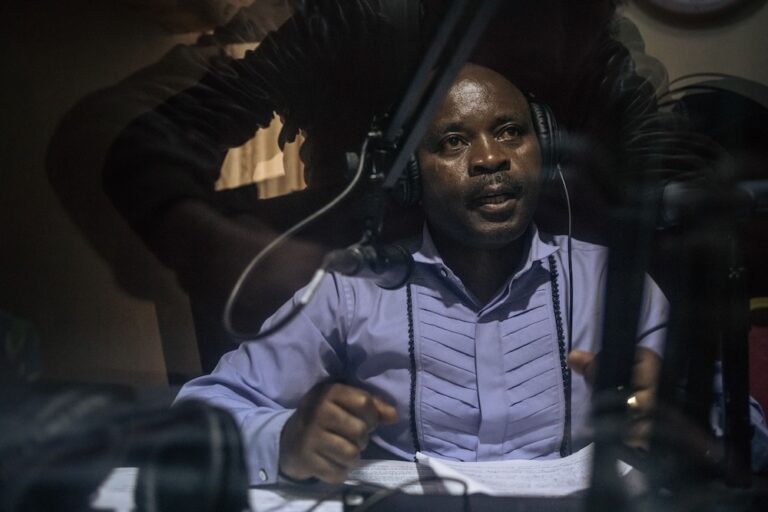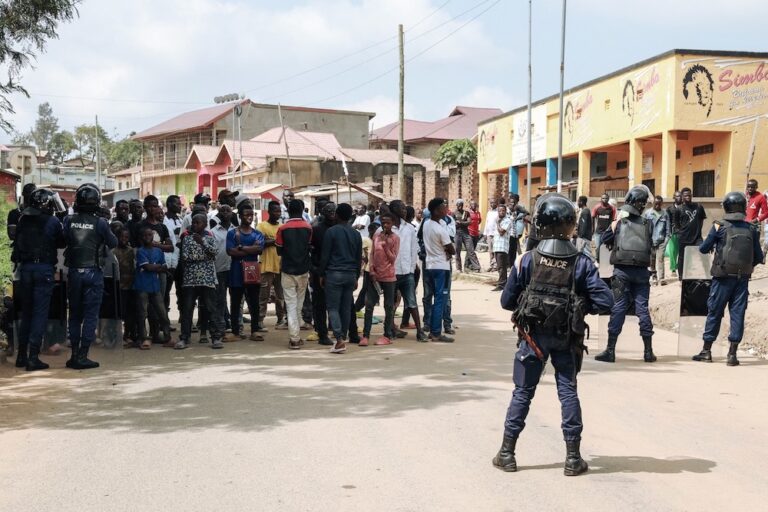(JED/RSF/IFEX) – The following is a joint press release issued by JED and RSF on 1 May 2001: Democratic Republic of Congo: Journalists persecuted in south-west of country On the eve of the celebration of the tenth World Press Freedom Day, the city of Matadi, located 350 km from Kinshasa, at the mouth of the […]
(JED/RSF/IFEX) – The following is a joint press release issued by JED and RSF on 1 May 2001:
Democratic Republic of Congo:
Journalists persecuted in south-west of country
On the eve of the celebration of the tenth World Press Freedom Day, the city of Matadi, located 350 km from Kinshasa, at the mouth of the Congo River (in the south-west of the Democratic Republic of Congo), rivals the Congolese capital as the leading light of repression of journalists. In the capital, the role of press freedom predator is played by men in power, both civilian and military, while in Matadi – the country’s main port city – it is the economic operators and merchants who attack the press, using their influence to silence journalists.
Washington Lutumba, 56 year-old correspondent for the Kinshasa-based daily Le Potentiel, was arrested and taken to the central prison on 30 March 2001 on the basis of provisional arrest warrant No. 0292/A.M signed the day before by magistrate Alain Mukaba of the Matadi High Court. Washington Lutumba is being prosecuted for making “harmful accusations” against the Joseph Bakery, which has its headquarters in Congo-Brazzaville and is represented in Matadi by Kiselo Aspirine. Le Potentiel had published, under Washington Lutumba’s name, an article entitled “45 000 bags of rotten Mouflon brand wheat flour unloaded at the port of Boma”. During
interrogation, Alain Mukaba asked the journalist to give the source of his information because, in the magistrate’s opinion, this article must have been “dictated” by a competing Congolese firm. On 23 April, André Niati Nzau, administrator for Interpresse, a newspaper distribution house in Matadi, was interrogated for nearly an hour by Alain Mukaba. He has been charged for distributing the issue of Le Potentiel that contained the article in question.
On 5 April 2001, the same case led another journalist to prison. Jules-César Mayimbi, 47 year-old correspondent for the Kinshasa-based daily Forum des As, published an article entitled “Sale of imported flour of questionable quality on the Lower-Congo market” in issue No. 1535 of 26 March 2001. Jules-César Mayimbi is also being prosecuted for making “harmful accusations” against the same bakery. The person responsible for this arrest is, once again, the firm’s representative in Matadi, Kiselo Aspirine. Investigators from Journaliste en danger (JED) who travelled to Matadi from 21 to 26 April 2001 learned that Kiselo Aspirine has family links to magistrate Alain Mukaba, who sent the two journalists to prison and who set the hearing date for 3 May 2001.
The JED delegation met with colleagues of the province’s governor, Séraphin Bavuidi Babingi. They did not know that these two journalists had been in jail for a month in the Matadi central prison.
Another case that illustrates the link between business and legal circles is that of Tsimba wa Nzuzi and Yoka Tseke Tiya, editor and sub-editor, respectively, for the weekly Kiese Magazine, summoned to appear in court on 19 April 2001. The plaintiff is an important merchant in Matadi: Pierre Mikalukidi Nsana. Kiese Magazine published, in issues 331 and 332 from 7 to 15 December 2000, an article entitled “Mimba Establishments of Mr. Pierre Mikalukidi Nsana, justify the use of 20,525,114 Congolese francs drawn from the coffers of Lower-Congo province”. In the article, the journalist asked that the owner of Mimba establishments explain the use of funds initially destined for the repair of a road in Matadi. The two journalists are also being prosecuted for making “harmful accusations” on the basis of article 74 of the Congolese Penal Code. On 8 February 2001, Tsimba wa Nzuzi was detained in the same case and sent to Matadi central prison by the Nkala-Nkala public prosecutor’s office. He was released two days later.
Finally, on 19 April 2001, members of the National Information Agency (Agence nationale des renseignments, ANR) based in Matadi burst into the headquarters of Radio-Television Matadi, a private regional chain. They seized advertisements for the World Health Organisation campaign on birth control and the fight against HIV, broadcast the day before, which showed how to use a condom. The ANR Matadi branch believe these images undermine accepted standards and public morale.
Journaliste en danger (JED) and Reporters sans frontières (RSF) ask the Congolese authorities, notably President Joseph Kabila:
– to order the immediate and unconditional release of journalists Washington Lutumba and Jules-César Mayimbi,
– to guarantee press freedom in all the territory of the Democratic Republic of Congo under government control.
The two organisations also urge the government to call the political, administrative and judicial authorities and the security services of Matadi to order, to stop them from abusing their positions and their power to hinder the media’s work in Lower-Congo province.
For further information, contact D. M’Baya Tshimanga, president, or Mwamba wa ba Mulamba, secretary-general, Journaliste en danger (JED), B.P. 633 Kinshasa 1, Democratic Republic of Congo, tel. +243 99 29 323, +243, 99 29 345, fax: +243 12 21974, e-mail: jedkin@ic.cd, Internet: http://www.congonline.com/Jed
or
Jean-François Julliard, RSF, 5, rue Geoffroy Marie, Paris 75009, France, tél: +33 1 44 83 84 84, téléc: +33 1 45 23 11 51, courrier électronique: afrique@rsf.fr, Internet: http://www.rsf.fr


